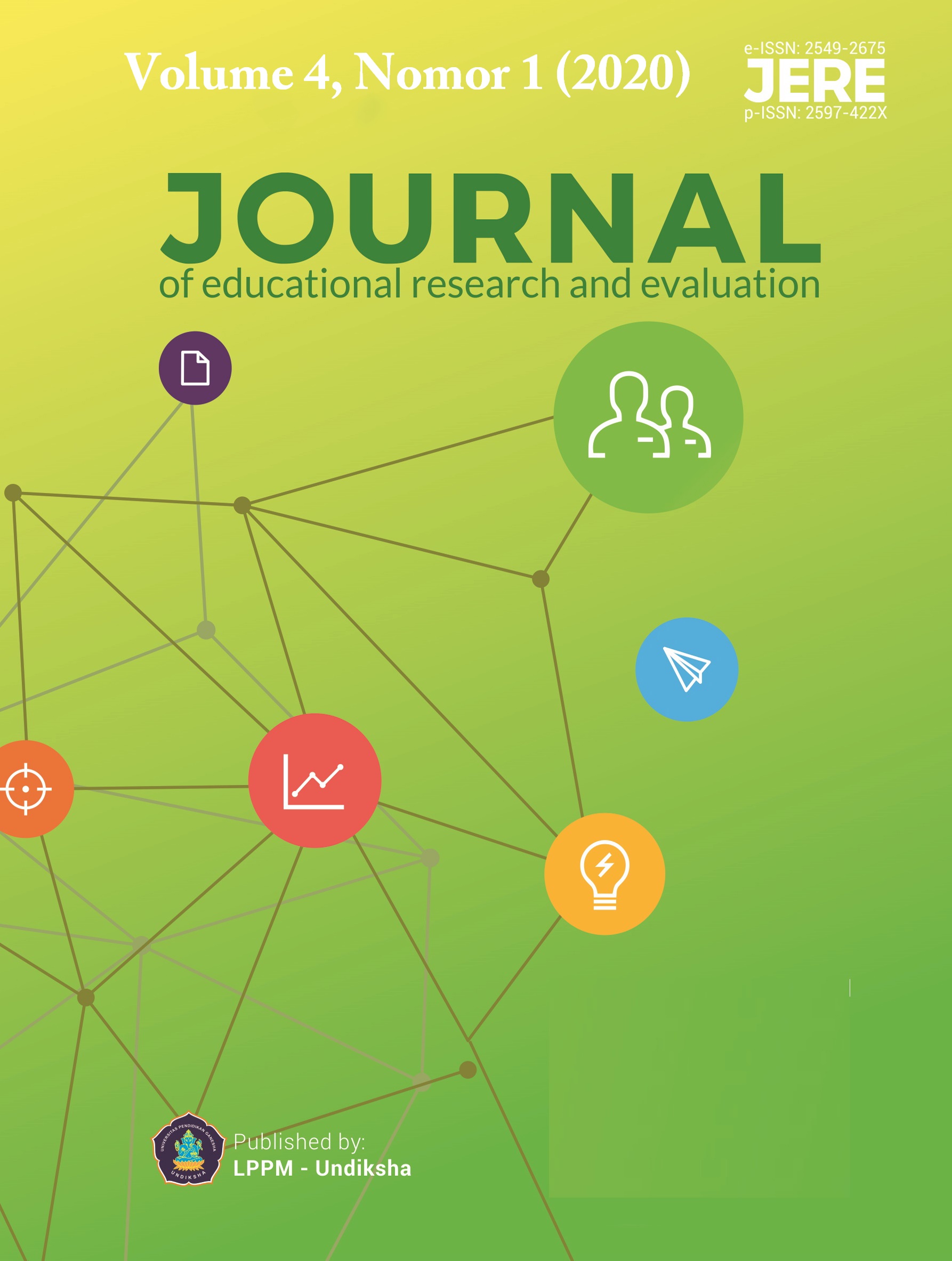Lexicogrammatical Analysis of Narrative Texts Written by First Semester Students at Unika ST. Paulus Ruteng
DOI:
https://doi.org/10.23887/jere.v4i1.23600Keywords:
Narrative text, transitivity analysis, language use, mood analysisAbstract
This research conducted a qualitative investigation of the transitivity structure, language use and mood structure of narrative texts written by first semester students at UNIKA St. Paulus Ruteng. The data sources of this study were narrative texts written by students on the English study programme. The researchers investigated the dominant transitivity process and analysed the mood structure of the students’ narrative texts using Miles and Huberman’s interactive model. The researchers collected data from the curriculum documentation and by interviewing and giving exercises to the students. Furthermore, the instrument was the researchers and the students’ worksheets. The findings showed that six transitivity processes were applied in the students’ writing. The processes were the material process, mental process, verbal process, behavioural process, relational process and existential process. The dominant process used was the material process, since the texts written by the students mostly contained action verbs describing the characters’ physical actions. The second most common process was the relational process, which was followed by the mental process with 34.15%. The verbal process accounted for only 7.41%. The other processes contained in the texts were the behavioural process and the existential process, and affect, status and contact were as mood aspect.
References
Alaei, M., & Ahangari, S. (2016). A Study of Ideational Metafunction in Joseph Conrad ’ s “ Heart of Darkness ”: A Critical Discourse Analysis. 9(4), 203–213. https://doi.org/10.5539/elt.v9n4p203
Andrea, P., Montes, G., María, A., Barboza, S., Isabel, A., & Olascoaga, L. (2014). Systemic Functional Linguistics and Discourse Analysis as Alternatives When Dealing With Texts. 16(2), 101–116.
Anggun, S. K. (2016). AN ANALYSIS OF DESCRIPTIVE TEXT IN ENGLISH TEXTBOOK USING TRANSITIVITY SYSTEM ( A CASE STUDY OF READING PASSAGES ). 4(1), 147–158.
Ansary, H. (n.d.). The Generic Integrity of Newspaper Editorials : A Systemic Functional Perspective.
Briones, R. R. Y. (2016). Textual Analysis through Systemic Functional Linguistics. Journal of English Language Teaching and Linguistics, 1(2). https://doi.org/10.21462/jeltl.v1i2.27
Emilia, E., & Hamied, F. A. (2015). Systemic Functional Linguistic Genre Pedagogy (Sfl Gp) in a Tertiary Efl Writing Context in Indonesia. TEFLIN Journal - A Publication on the Teaching and Learning of English, 26(2), 155. https://doi.org/10.15639/teflinjournal.v26i2/155-182
Ettaleb, M., Latiri, C., Douar, B., & Bellot, P. (2016). SBS 2016 track mining: Classification with linguistic features for book search requests classification. CEUR Workshop Proceedings, 1609, 1079–1088.
Grammar, F., & Grammar, F. (n.d.). Halliday ’ s Introduction to Functional Grammar.
Lapoto, S., & Potradinata, A. (2018). An Analysis of Student ’ s Descriptive Text Writing in Systemic Functional Linguistic ( SFL ) Perspectives. 4(2). https://doi.org/10.18178/ijlll.2018.4.2.161
Li, M. (2015). Teaching and Research of Systemic Functional Linguistics in a Regional Context. 8(5), 189–194. https://doi.org/10.5539/elt.v8n5p189
Lukin, A., Moore, A., Herke, M., Wegener, R., & Wu, C. (2011). Halliday’s model of register revisited and explored. Linguistics and the Human Sciences, 4(2), 187–213. https://doi.org/10.1558/lhs.v4i2.187
Manfredi, M. (n.d.). Systemic Functional Linguistics as a tool for translation teaching : towards a meaningful practice. 49–62.
Noor, M., Ali, M., Muhabat, F., & Kazemian, B. (2016). Systemic Functional Linguistics Mood Analysis of the Last Address of the Holy Prophet ( PBUH ). 4, 1–9. https://doi.org/10.11648/j.ijll.s.2016040101.11
Nurohmah, I. (n.d.). An Analysis of Students ’ Recount Text by Using Systemic Functional Grammar. 1(2), 89–98.
The Cultural Problem of the Cultural Anthropologist - Hsu - 1979 - American Anthropologist - Wiley Online Library. (n.d.).
Tshotsho, B. (2014). Assessing Students ’ Academic Writing Using Systemic Functional Linguistics at a University in South Africa. 6(3), 425–433.
Wei, J. (2014). Theme and thematic progression in learner English: A literature review. Colombian Applied Linguistics Journal, Vol. 16, p. 67. https://doi.org/10.14483/udistrital.jour.calj.2014.1.a06
Zhang, J. I. E. (2017). A Comparative Study of English Systemic Functional Linguistics in the Conclusion of the Thesis. (Adess), 87–92.
Downloads
Published
Issue
Section
License
Authors who publish with the Journal of Evaluation and Research in Education (JERE) agree to the following terms:
- Authors retain copyright and grant the journal the right of first publication with the work simultaneously licensed under a Creative Commons Attribution License (CC BY-SA 4.0) that allows others to share the work with an acknowledgment of the work's authorship and initial publication in this journal.
- Authors are able to enter into separate, additional contractual arrangements for the non-exclusive distribution of the journal's published version of the work (e.g., post it to an institutional repository or publish it in a book), with an acknowledgment of its initial publication in this journal.
- Authors are permitted and encouraged to post their work online (e.g., in institutional repositories or on their website) prior to and during the submission process, as it can lead to productive exchanges, as well as earlier and greater citation of published work. (See The Effect of Open Access)











